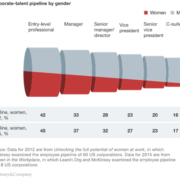Employers benefit by ‘talking flex’ when recruiting
In this opinion post Jessica Chivers shares her views on the competitive advantage gained by employers who state upfront on job adverts and at interview that there’s scope to talk flexible working.
“Should I mention that I’m really looking for four days a week rather than FT?”
“Will I put them off if I ask about flexible working at interview?”
“At what point in the hiring process is it best to ask about flexible options?”
These questions, and variations of, are commonplace in executive coaching sessions where women are exploring how to move on and/or up in their career.
It strikes me that many employers are missing a very real competitive advantage by not placing the words “up for talking flexibility’ on job adverts seeking mid to senior professionals for full time roles. This is particularly relevant if the organisation has made a public commitment to increasing the number of women at the top of their business, as say McKinsey has done. The employer is under no obligation to offer flex but by including these words, they’ve probably doubled the pool of people who might apply. A winning strategy, surely?

As an aside, McKinsey have just revealed their latest gender equality research (in conjunction with LeanIn.org) and show that women’s journey to the top is still appallingly slow. Change needs to come quickly.
In reality the onus is all too often on the candidates’ shoulders to ask about flexibility, and with so many stories about women noticing a negative change in the recruiter when they ask, it’s no wonder women hold back from applying for FT roles.
Where jobs adverts make no mention of flexibility, it would be useful if the recruiting manager ‘put it out there’ at the start of the interview (and not just when they’re interviewing females of a certain age – men want more flex too). “We’re advertising for a full time member of the team to be based predominantly in Manchester but depending on who we meet, there’s scope for the role to be done flexibly. We can talk about that further down the line.” There, easy.
I’m noticing a growing problematic pattern of women ‘choosing’ to stay in jobs they’ve outgrown because it gives them the flex they want (or more likely need) to be able to have a decent, wholesome family life where kids get help with their homework and at least one meal gets eaten together as a family.* There’s a belief that the only way to maintain this flex is to put it on hold, work full time for a new employer and prove oneself again (a hazy concept, but that’s an issue for another post) and then negotiate flex. The difficulty with this is it’s usually not that easy to switch to being an FT worker if you have children too young to have a key to the front door. For starters, the chances are you won’t be able to up your childcare to cover it.
A final point to ponder: could it be that the journey towards gender balance at the top of our organizations is slow because women are staying put when it’s time to move on? That they’re sacrificing stretch for flex and just not going after the next job? Giving women and men permission to discuss flexible working could be the key to change.
I’m optimistic that smart employers will soon start to print words to the effect of “up for talking flex” on their job ads and that their businesses will be all the better for it. I suspect we need some ballsy HR Directors to tap their CEOs on the shoulder to make it happen. Are you out there?
What do you think? Are you explicit about flexibility in your recruitment activities? Have you asked about flexibility at interview and had a good response?
* Yes, there are people without children who crave flex too. There are people with horses that need turning out each morning, there are people with elderly caring responsibilities and there are people who just want to have a darn good time at the weekend living a different life by the sea. They all want or need flex too and if they can get the job done without having their backsides on their swivel chair from 8.30-5.30pm every day then why not?)




Trackbacks & Pingbacks
[…] Our view is that employers who are experiencing talent shortages could significantly widen their candidate pool by being open to flexible working, and making this clear to candidates at the point of hiring. Read “Employers benefit by ‘talking flex’ when hiring.” […]
Leave a Reply
Want to join the discussion?Feel free to contribute!